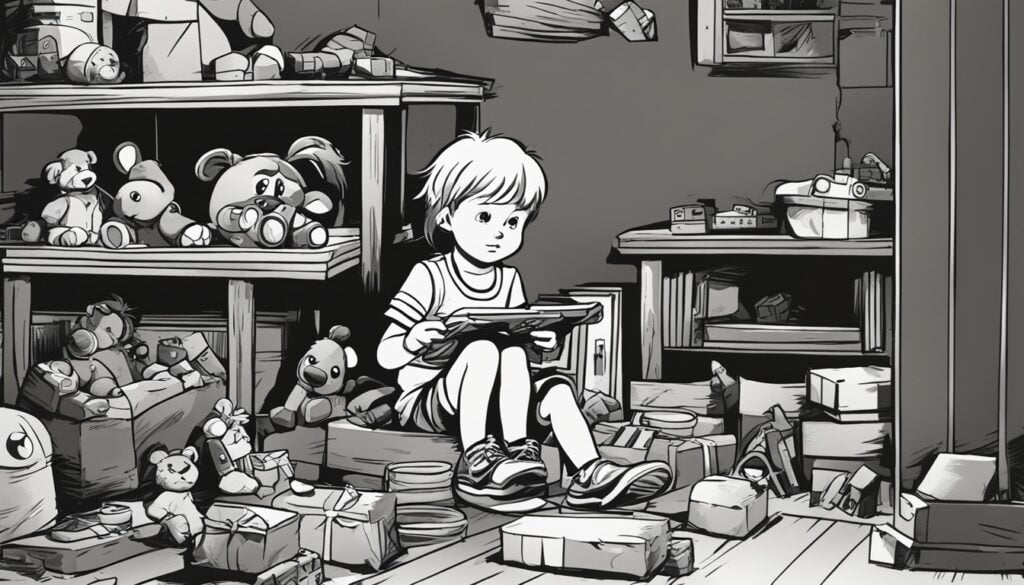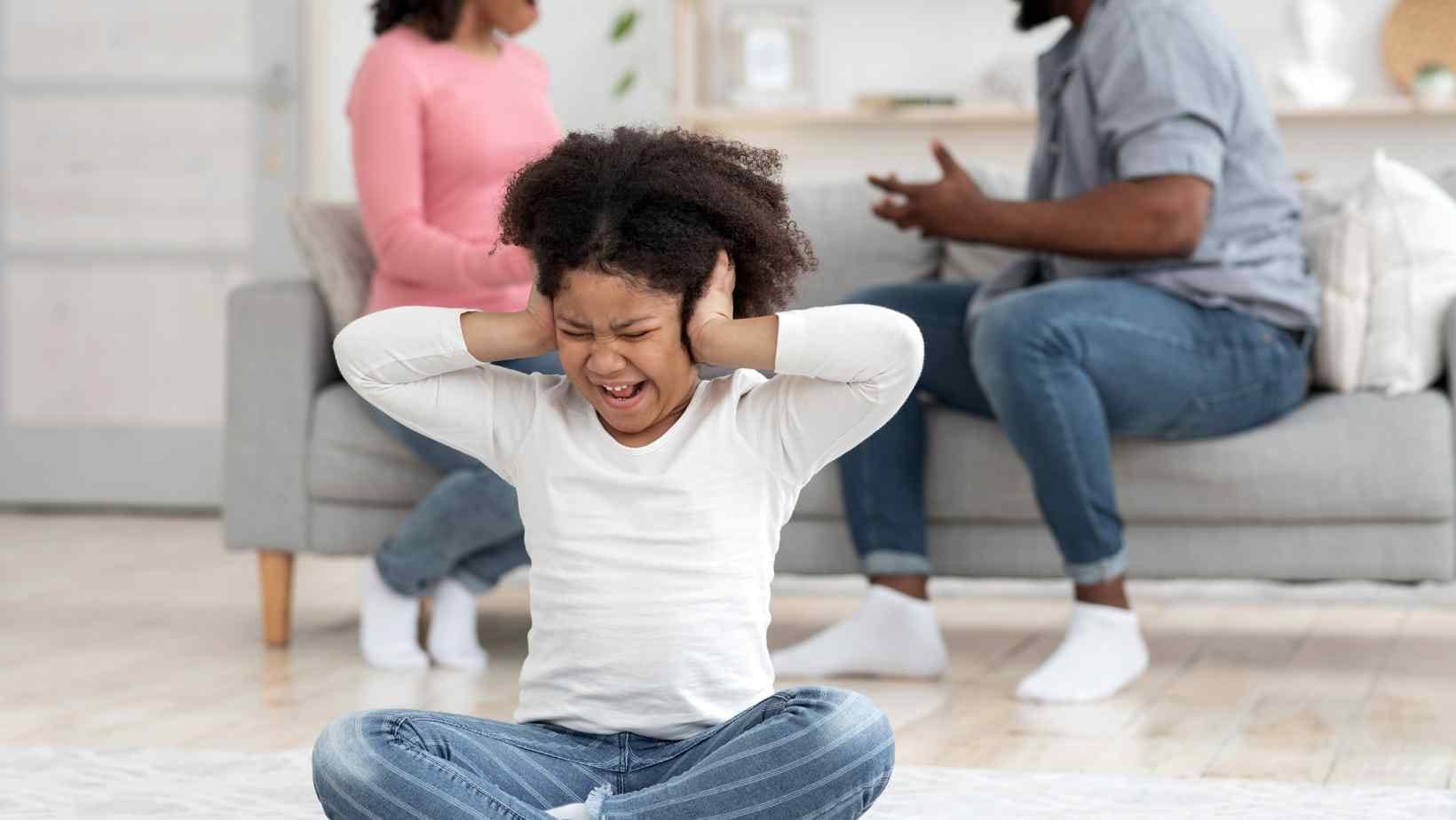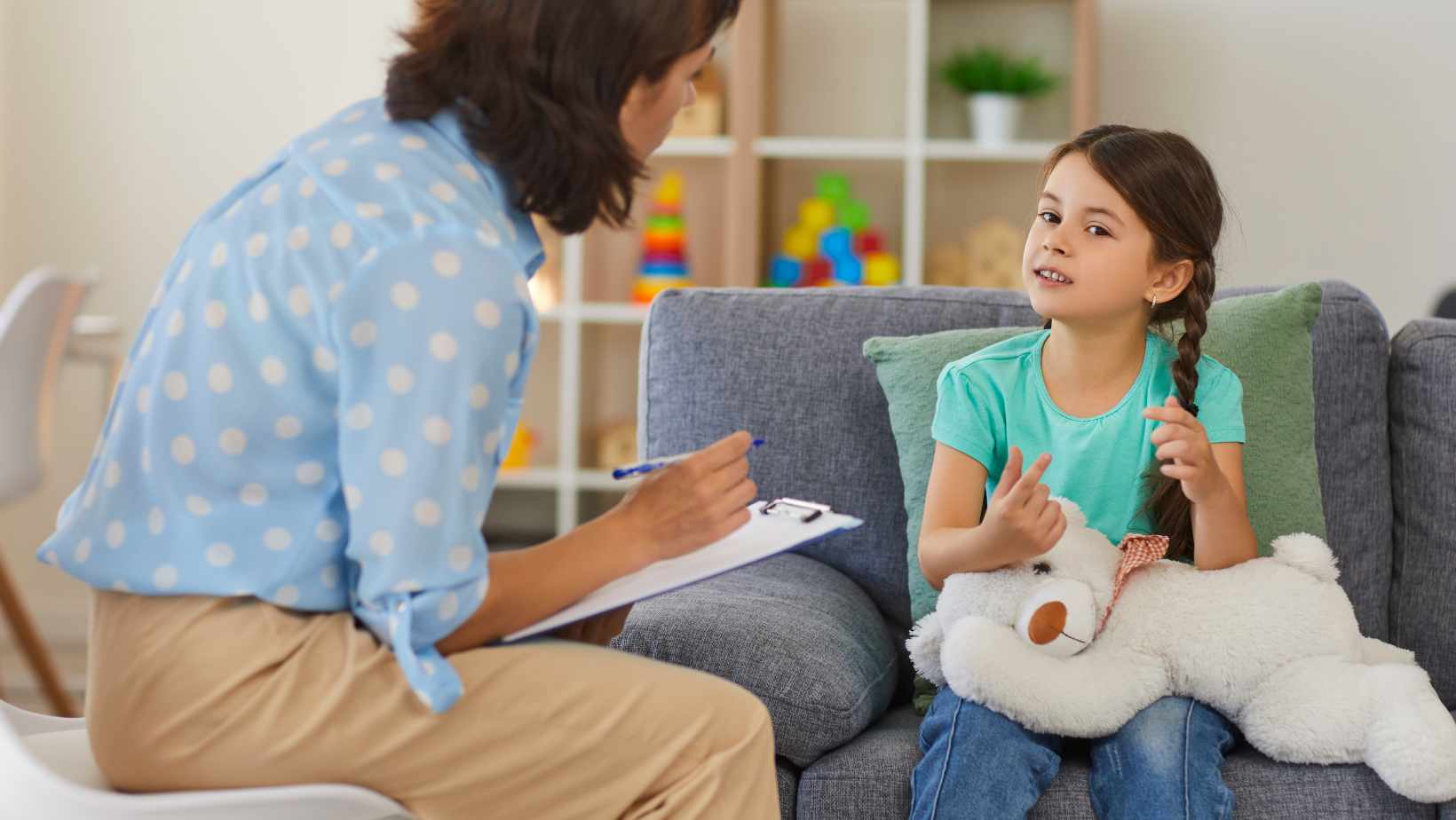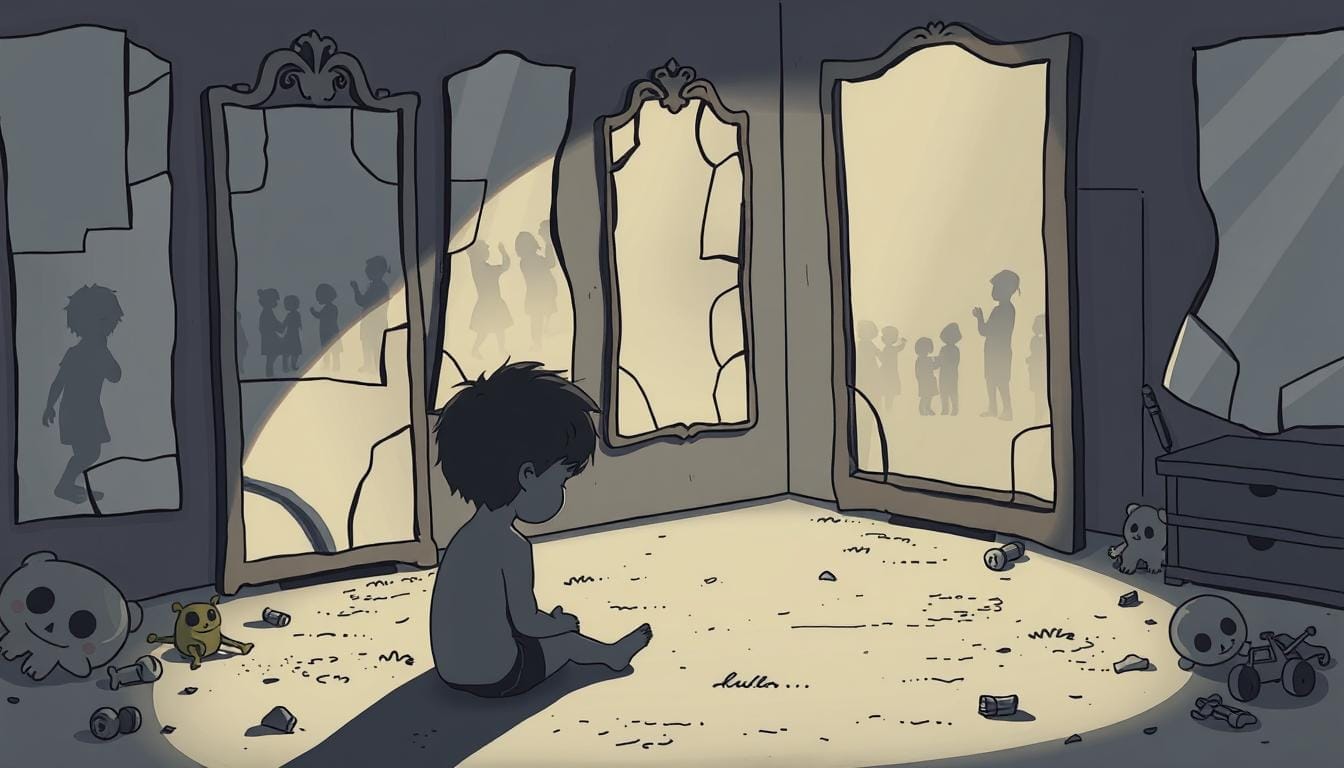As a parent or caregiver, you are key in helping children who have faced early childhood trauma. Trauma deeply affects a child’s growth in many ways. This guide aims to give you the knowledge and tools to make a safe, caring space for these children.
Early childhood trauma can take many forms, like neglect, abuse, or big life events. Knowing about trauma’s signs and effects helps you support children who have been through it. This guide will cover how trauma affects kids and the important role caregivers play in helping them heal.
Working with mental health experts is crucial for helping trauma-affected children. This guide will show why this partnership is important. It will also offer strategies for working together to help children heal and become resilient.
This guide is for parents, teachers, or community leaders. It aims to give you the power to create a safe, caring space. This space helps children deal with early childhood trauma and grow strong.
Table of Contents
ToggleWhat is Early Childhood Trauma?
Early childhood trauma means going through hard times that can deeply affect a child’s mind, body, and feelings. These tough events include neglect, abuse, seeing violence, and losing someone close. It’s key to understand early childhood trauma to help children who have gone through it.
Types of Traumatic Events in Early Childhood
The National Child Traumatic Stress Network lists many traumatic events that kids might face early on. These include:
- Psychological, physical, or sexual abuse
- Community or school violence
- Seeing or going through domestic violence
- Natural disasters or acts of terrorism
- Sudden or violent loss of a loved one
These traumatic events, or ACEs, can greatly affect a child’s growth and health. Knowing about these traumas helps us give the right support and help.
Understanding early childhood trauma and its forms is vital. It helps us tackle this big issue and support our young ones in growing strong and resilient.
Prevalence of Early Childhood Trauma
Early childhood trauma affects millions of young lives. At least 1 in 7 children faced abuse or neglect last year. The true number of traumatized children is likely higher. In 2019, a shocking 1,840 children died from abuse and neglect in the U.S.
Childhood adversity has a big impact every day. Over 1,000 youth go to the emergency room for assault injuries daily. About 1 in 5 high school students were bullied at school last year. These numbers show how common trauma is among young children.
We must pay attention to early childhood trauma. By understanding this issue, we can help children, support families, and create a healing society. This way, we can lessen the effects of childhood adversity and give our young people a better future.
Signs and Symptoms of early childhood trauma
It’s key to spot trauma signs in young kids to help them. Kids react differently to traumatic events. Knowing the signs helps us support them better.
Some common signs of trauma in young children include:
- Fear of separation from parents or caregivers
- Excessive crying or screaming
- Poor appetite or weight loss
- Recurring nightmares
- Increased anxiety or fearfulness
- Difficulty concentrating or paying attention
- Sleep disturbances
As kids get older, trauma symptoms change. Elementary school kids might feel sad, lonely, or have trouble in school. Teenagers might turn to harmful behaviors like drugs, self-harm, or risky sex to deal with their feelings.

Spotting trauma early in kids can really help them. By knowing how trauma shows up in kids, we can give them the right help. This way, they can heal and do well in life.
The Body’s Alarm System and Trauma Response
Our bodies have a built-in alarm system to keep us safe. When it goes off, it starts a stress response called the “fight or flight” reaction. This can deeply affect kids who faced trauma early on.
The body’s trauma response is automatic when we feel danger. If a child feels threatened, their brain tells the body to release hormones like adrenaline and cortisol. These hormones get the body ready for a fight or flight reaction, making the heart race, blood pressure go up, and muscles tense.
But, this stress response in children can happen in non-threatening situations too. It can make kids feel scared, angry, or pull away. The physiological effects of trauma can really affect a child’s health, both body and mind. It’s key to know and deal with this.
To help kids with their alarm system, teaching them how to spot stress triggers is vital. Also, showing them how to relax, like through deep breathing, is important. By helping kids understand and control their body’s trauma response, we can help them be more resilient and get past early trauma.
Impact of Early Childhood Trauma
Childhood trauma can have lasting effects that go beyond the early years. Survivors often face challenges like learning problems, more health and mental health services, and issues with child welfare and justice. They may also have physical health issues like diabetes and heart disease.
Early trauma greatly increases the risk of mental health problems. It’s a big risk factor for many behavioral and substance use disorders. Kids who go through trauma might deal with anxiety, depression, PTSD, and other mental health issues into adulthood.
Long-term Consequences
The effects of trauma in early childhood can be deep and complex. Trauma can harm brain development, make it hard to manage emotions, and affect how well a child forms relationships. This can cause many challenges, including:
- Academic and learning difficulties
- Increased risk of substance abuse and addiction
- Difficulty keeping stable jobs or relationships
- Physical health problems such as traumatic brain injury, diabetes, and heart disease
- Involvement with the child welfare or juvenile justice systems
But, with the right support and help, kids can overcome early childhood trauma. They can lead happy, healthy lives. By tackling the effects of trauma and giving kids the tools to heal, we can lessen the long-term effects and help them succeed.
Supporting Children’s Recovery from Trauma
Helping young children recover from trauma takes a lot of effort. Caregivers and support systems play a huge role in this. By supporting children from trauma, we help them feel safe, strong, and hopeful again.
Recovery strategies include making a safe space for kids. This means:
- Telling them they are safe and their feelings are okay
- Explaining the traumatic event wasn’t their fault
- Being patient and understanding with their feelings
- Getting help from mental health experts when needed
It’s crucial to give trauma-informed care to young children. This helps caregivers support their healing. By helping kids deal with trauma, we build their resilience. This lets them face challenges with strength and kindness.

Recovery isn’t always easy, but with the right support, kids can get past trauma. They can feel safe, trust others, and be happy again. By focusing on trauma recovery, we help young people and make the world a better place for everyone.
Role of Caregivers and early childhood trauma
As a caregiver, you are key in helping children who have gone through trauma. By knowing how trauma affects them, you can offer care that helps them heal and grow. Trauma-informed care means making a safe space where kids can feel in control and trust again.
Supporting children from trauma means building strong, caring relationships. This includes:
- Creating a steady, predictable routine for security
- Supporting them in expressing feelings in a healthy way
- Accepting their feelings and experiences without judging
- Teaching them ways to handle stress and overwhelm
It’s also vital to look after your own feelings. Taking care of yourself helps you stay connected to the child’s needs. Self-care lets you manage your feelings and support the children better.
Your job goes beyond just physical care. You are a source of emotional strength, safety, and healing for kids who have been through trauma. By understanding their needs and taking care of yourself, you can change their lives for the better.
Collaborating with Mental Health Professionals
When a child faces early childhood trauma, working with mental health experts is key. These include child therapists, social workers, and trauma specialists. They bring skills and knowledge that help childcare providers care for the child better.
Teaming up with mental health pros has many benefits. You get insights into what the child needs and can plan a full support plan. They offer therapies like trauma-focused therapy to help the child heal.
These experts also teach how to make a safe, caring space for the child. They help you tackle any emotional or behavioral issues the child has.
Working together on childhood trauma is crucial. With mental health pros, you make sure the child gets all-around support to recover and do well. This teamwork leads to better results for the child and a stronger community.
You’re not going it alone. Asking for help from mental health experts shows you’re dedicated to giving the best care to the kids. Together, you can tackle the tough issues of early childhood trauma. You’ll help these young ones move forward on their healing journey.
Conclusion
Helping children recover from early trauma takes a team effort. Childcare workers like you are key in supporting kids on their healing journey. You can help by spotting trauma signs, using supportive methods, and working with mental health experts. This creates safe spaces for kids to heal and grow.
Understanding early childhood trauma shows us the need for a full approach to help kids. Caregivers play a big part in this. They must know how to care for kids who have been through trauma. With this knowledge, you can change lives, helping kids look forward to a bright future.
Your work in making a safe, caring place for kids shows your commitment. By using trauma-informed care, you help kids grow and do well. You give them the tools to beat early trauma and flourish.
FAQ
What is early childhood trauma?
Early childhood trauma is when bad experiences deeply affect a child’s health. This includes neglect, abuse, violence, and losing someone close.
What are the types of traumatic events in early childhood?
Traumatic events for young kids include abuse, violence, seeing violence, and losing someone suddenly. Natural disasters and terrorism also count.
How prevalent is early childhood trauma?
About 1 in 7 kids face abuse or neglect yearly. In 2019, 1,840 kids died from abuse. Every day, over 1,000 youth go to the ER for assault injuries. Also, 1 in 5 high schoolers were bullied last year.
What are the signs and symptoms of early childhood trauma?
Traumatic stress shows differently in each child. Young kids might be scared of being apart from their caregivers. They could also cry a lot, not want to eat, or have bad dreams.
Older kids might feel anxious, have trouble focusing, or sleep poorly. Teens might feel sad, eat too much or too little, or use harmful substances.
How does the body’s alarm system respond to trauma?
Our body has an alarm to keep us safe. It gets ready to fight or run when it senses danger. This can make kids feel scared, angry, or withdrawn.
Children can calm down by knowing what scares them, checking if it’s real danger, and using deep breathing.
What are the long-term consequences of early childhood trauma?
Trauma can lead to learning issues, more health and mental health visits, and problems with child welfare. It can also cause long-term health issues like diabetes and heart disease. Trauma increases the risk of mental health and substance use disorders.
How can caregivers support children’s recovery from trauma?
Caregivers can help by being nurturing and consistent. They should keep routines steady and let kids express feelings. It’s also important for caregivers to take care of their own feelings to be fully there for the child.
Why is it important to collaborate with mental health professionals?
Working with mental health experts like therapists and social workers helps kids with trauma. These professionals have the skills to support childcare providers. Their advice can really help kids heal.
Source Links

Dr Chandril Chugh
Dr.Chandril Chugh is a neurologist who trained and practiced in the USA for more than a decade. He is compassionate and caring and is most well known for being a patient listener and spending ample time with patients.
Related Blog Posts
Different Types of Childhood Trauma: An Overview
April 25, 2025
How Childhood Trauma Impacts Adult Mental Health
December 28, 2024
How to Build a Daily Routine for Optimal Mental Performance
December 20, 2024




